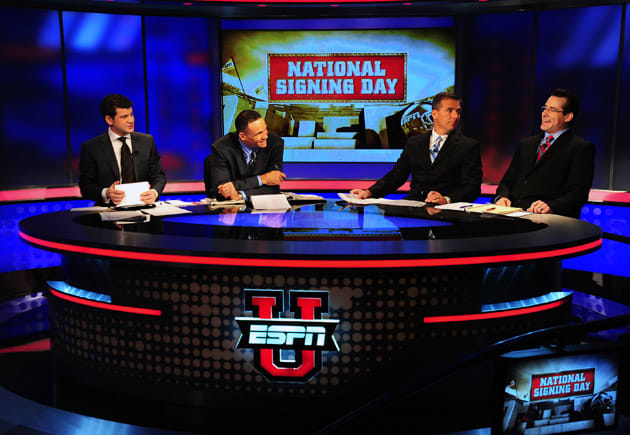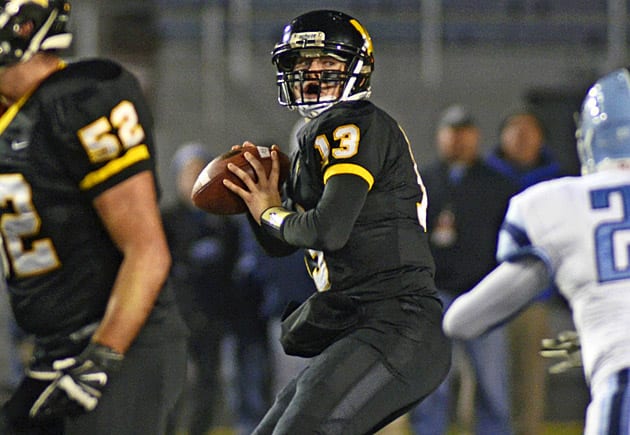what does it mean to commit to a college
The bicycle began early on for Sam Bruce. One of the top wide receiver recruits in the class of 2016, Bruce collected more than than 10 scholarship offers by the summer after his freshman season at St. Thomas Aquinas (Fla.) High. After weighing his options, Bruce verbally committed to Miami last July. "It's in my backyard and I know all my family will be able to nourish my games," he said, according to the Miami Herald .
Nevertheless it didn't have long before the strength of his pledge was called into question. A month afterward Rivals.com published a report in which Bruce said, "It looks similar I'm non changing [schools]." In December he said he wanted to hear from Oregon, explaining that "on a scale of ane to 10 to Miami, I'yard a seven," per The Oregonian. By Jan Bruce indicated to Rivals.com that he was simply 60% committed.
• STAFF: 100 reasons to be excited for the 2015 higher football season
Equally of Tuesday Bruce still lists himself as a Miami commit on his Twitter profile. However, the tone of his public comments cast doubt equally to whether he will sign with the program on National Signing Day. While the incertitude conveyed by the coverage of Bruce's recruitment has not been out of the ordinary, it lends insight into the circuitous nature of the modern college football recruiting delivery.
As the number of publications that cover recruiting has grown over the by twenty years, the term "commitment" has go increasingly difficult to decipher. It encompasses an array of subcategories that obscure what seems like a relatively straightforward gesture. Phrases such as heavy lean, soft commit, silent commit and solid to schoolhouse X take risen in popularity, all of which imply varying levels of balls that a prospect will go along to play for a given school.
When a player verbally commits, the general understanding is he is declaring his intention to enroll. In many instances, though, this conclusion is far from accurate.
*****

Charlotte Observer/Tribune News Service/Getty Images
The meaning of commitment was not always and so abstruse. Allen Wallace, who began to encompass recruiting with the publication of his magazine SuperPrep in the mid-1980s, says public commitments used to exist rare. Equally a reporter, he attempted to focus on predicting where players would sign come up February. On the occasions in which prospects did outcome exact commitments, Wallace says, the process did non involve sifting through a ream of ambiguous proclamations.
Through a series of interviews, Wallace—who has since left the industry—says he was able to separate players' favorite schools from their weaker options and then confirm commitments through assistants. "I thought I was doing a good task, but I realized that I was but at the tip of the iceberg," Wallace says. "I hateful, considering what the child was really telling me was, 'I'yard committed.' But to me, he's just maxim, 'Well, they're a real potent favorite.' So that only changed my emphasis."
Everything you've ever wondered about satellite camps; #DearAndy
Wallace publicized information virtually recruits in magazines and on fax lists. This proved to be sufficient for a while, but the Internet changed the way news was disseminated. Information technology also facilitated an expansion of recruiting-focused media: Beyond local newspapers, there are at present a bevy of outlets devoted to tracking recruiting, including Rivals.com, 247Sports.com and Sentry.com—all of which take team-specific sites—plus ESPN, Bleacher Report and SB Nation.
Still while more prospects are being identified earlier in their high school careers than ever before, coverage has become diluted, Wallace says. A combination of a want for expediency in a faster news bike and recruits' mounting unwillingness to speak with media, among other factors, has produced a steady stream of reports that—in Wallace'due south view—fail to provide insight into players' thinking.
Another byproduct of the boom in coverage is an urge to attach newsworthiness to statements that may lack significance. For example, in some cases there could exist a pocket-sized difference between a role player noting that a specific schoolhouse is his leader and saying that he is leaning toward that school. Should the two be treated as separate developments? Or are they one in the same?
Scroll to Continue
SI Recommends
Put more simply: Which expressions concur meaning in a recruiting dictionary that has become overwhelmingly vague?
Mike Farrell, the national recruiting managing director for Rivals.com who has been covering college football recruiting since 1998, says some of the rhetoric used in concert with players' commitments has been in place for more than than a decade, while other aspects have evolved. "It's funny, because a lot of the terminology was created based on what started to occur with the recruiting," Farrell says.
• STAPLES: Breaking downwards the SEC'due south new rule for incoming transfers
Oral commitment, Farrell says, has been replaced past the term verbal commitment, while leader is more than in faddy than lean. Though flip and decommit have endured in the commitment lexicon to describe prospects switching schools, soft verbal is a newer cosmos used to label players who accept committed to one program but all the same intend to visit others. Boosted expressions include coaches squeezing players to commit, and placeholder commitments—ones that are temporary past design.
What does it all mean? Ben Zimmer, a linguist and linguistic communication columnist for The Wall Street Journal, points out that commitments could be interpreted as "oral communication acts," in which people effort to carry out a job using linguistic communication. However, he likened the proliferation of convoluted recruiting vocabulary to legal jargon.
"The more elaborate this whole sort of system becomes, the more elaborate the language becomes to try to sort of classify potential decisions," he says. "The whole procedure gets and so amped up, so amplified through the constant analysis and everyone watching and waiting that the language gets amped up to lucifer it."
*****

Ralph Wilson/AP
Anthony Russo, a grade of 2016 quarterback from Archbishop Forest Catholic (Pa.) High who committed to Rutgers on May eighteen, says he believes "once you lot commit, that should be your last decision." South Carolina quarterback commit Brandon McIlwain echoed that sentiment. "[A commitment] means that the player has all intentions in their mind that they're going to that school," McIlwain says. "I feel like it merely means that the rest of your recruitment should be pretty much shut down."
Others prospects exercise non feel commitments connote the aforementioned level of certitude. Our Lady of Mountain Carmel (Md.) Loftier defensive end Josh Kaindoh says the only example in which a commitment should be considered terminal is when a histrion gets his "dream offering." Otherwise, "I think that everybody should explore their options," he says.
• STAPLES: SEC Network success creating Titanic Two of league finances
Or, as S Brunswick (N.J.) Loftier receiver and Rutgers commit Mohamed Jabbie puts it, "As teenagers, we're really indecisive about where we want to become. Ane day we have a school we desire to go to, and then the adjacent twenty-four hour period nosotros're like, 'Nah, I don't want to go to that school.' Information technology's not unacceptable. It's dandy."
Perhaps that's the root of the confusion. Recruiting is notoriously fickle. And in an era in which decommitments have become commonplace—according to research conducted by SI.com's Andy Staples in January 2012, xiv.6% of players ranked in the Rivals100 betwixt '07 and 'eleven renounced their commitments at some point, and 62% of those signed with a different school than the one to which they initially pledged—it just makes sense that coverage of recruiting would be the same.
In any outcome, as the corporeality of ink spent on recruiting grows, fans are probable to come beyond more than obscure phrases and terms. A college football commitment should exist a simple development. In reality, it can exist very difficult to encompass.
Source: https://www.si.com/college/2015/06/02/college-football-recruiting-commitment-language-meaning